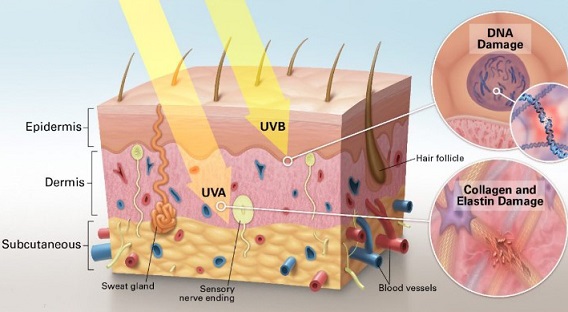Thailand medical experts discover new factors that provide UVB protection for skin cells
Nikhil Prasad Fact checked by:Thailand Medical News Team Oct 09, 2024 1 year, 4 months, 2 weeks, 1 day, 5 hours, 59 minutes ago
Thailand Medical: Researchers from several prestigious Thai institutions have made an important discovery that could protect your skin from harmful UVB rays. Their focus was on the effects of keratinocyte-derived factors on melanocytes, the cells responsible for pigmentation, which are often damaged by excessive UVB exposure. The research, conducted by teams from Walailak University and Mahidol University, highlights two key factors: granulocyte colony-stimulating factor (GCSF) and chemokine ligand 20 (CCL20), which were found to protect melanocytes from UVB-induced damage. This
Thailand Medical News report dives into the details of their groundbreaking study.
 Thailand medical experts discover new factors that provide UVB protection for skin cells
The Study's Purpose
Thailand medical experts discover new factors that provide UVB protection for skin cells
The Study's Purpose
Chronic exposure to ultraviolet B (UVB) rays from the sun can harm melanocytes, leading to skin conditions, including melanoma, a type of skin cancer. UVB radiation not only damages the DNA of these cells but also increases oxidative stress. The researchers sought to identify whether keratinocytes, a type of skin cell, can produce protective factors when exposed to UVB light, and if these factors can, in turn, protect melanocytes from damage.
By studying the interactions between keratinocytes and melanocytes, the scientists aimed to discover which proteins or substances could act as protective shields for melanocytes. In particular, they focused on GCSF and CCL20, both of which had shown potential in earlier research. This article explores the findings that were critical in uncovering new insights about skin protection against UVB-induced damage.
How The Study Was Conducted
The researchers carried out their experiments both in the lab and on live animals, combining RNA sequencing analysis with laboratory and in vivo tests. They exposed keratinocytes to UVB radiation and studied the changes in gene expression using RNA sequencing. They also conducted experiments using recombinant proteins to observe how GCSF and CCL20 affected melanocytes exposed to UVB.
Key findings included the increased production of GCSF and CCL20 in UVB-irradiated keratinocytes. These two substances were shown to reduce melanocyte apoptosis (programmed cell death) and oxidative stress, while also stimulating processes involved in skin pigmentation, such as tyrosinase production. Tyrosinase is a crucial enzyme involved in melanin production, which gives skin its color and protects against further UV damage.
The Protective Role of GCSF and CCL20
The researchers found that GCSF and CCL20 offered significant protection to melanocytes. These two factors were secreted by keratinocytes in response to UVB exposure, and their presence reduced oxidative stress and lowered the chances of melanocytes undergoing apoptosis. At the same time, these factors helped boost melanin production by increasing tyrosinase activity.
Melanin plays an essential role in shielding the skin from further UV damage by absorbing and dispersing UV radiation. The upregulation of melanogenes
is-related genes, such as tyrosinase, suggested that GCSF and CCL20 do more than just prevent cell death - they actively help melanocytes strengthen their defenses against UVB radiation.
In their tests, the researchers observed that recombinant GCSF and CCL20 provided similar benefits to melanocytes, confirming that these factors alone can be effective in protecting skin cells from UVB-induced damage.
Insights from Animal Models
The research team also conducted experiments on mice to validate their findings in a living organism. They exposed the animals to UVB radiation and then analyzed the protective role of GCSF and CCL20 in skin tissue. The results were consistent: mice that were exposed to UVB had higher levels of GCSF and CCL20 in their skin, and this increase correlated with a rise in melanin production and a reduction in cell damage.
Interestingly, the study showed that the protective effects were not limited to lab-cultured cells. The researchers concluded that GCSF and CCL20 could play a significant role in preventing skin damage and promoting repair in real-world situations, such as sun exposure.
Potential Applications and Future Directions
The protective qualities of GCSF and CCL20 could lead to new skin treatments. As these substances are naturally produced by keratinocytes in response to UVB exposure, they could potentially be used in skincare products aimed at boosting the skin's natural defenses against the sun. Lotions or treatments containing GCSF or CCL20 might help prevent sunburn, reduce the risk of skin cancer, and mitigate premature aging caused by UV exposure.
Further research is needed to explore the exact mechanisms by which GCSF and CCL20 exert their protective effects and to determine whether these substances can be used in clinical settings. The researchers believe that GCSF and CCL20 could eventually be used as part of a targeted therapy for people at high risk of skin damage, such as those with fair skin or a history of skin cancer.
Conclusions
This study sheds light on how the skin naturally defends itself against UVB damage and how we might harness these protective mechanisms for future treatments. The discovery that GCSF and CCL20 can significantly reduce melanocyte damage and promote melanin production opens the door to new preventative skincare strategies. By enhancing the skin’s natural resilience, these factors could lead to better protection against the harmful effects of the sun.
The study findings were published in the peer-reviewed journal: Cells.
https://www.mdpi.com/2073-4409/13/19/1661
For the latest research news, keep on logging to
Thailand Medical News.
Read Also:
https://www.thailandmedical.news/news/thailand-medical-researchers-explore-triphala-s-role-in-combating-obesity
https://www.thailandmedical.news/news/thailand-medical-researchers-discover-breakthrough-in-stroke-recovery-using-marine-algae
